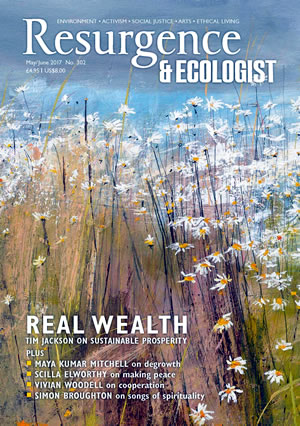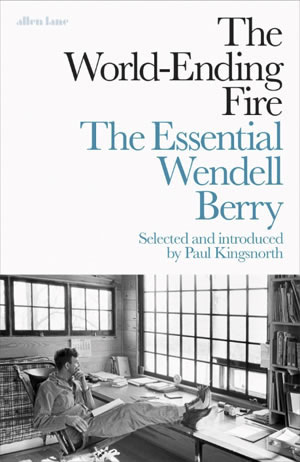Back in 1991, I wrote the Foreword for an earlier collection of Wendell Berry’s essays called Standing on Earth. It started as follows:
“I’ve never met Wendell Berry. But he’s one of those authors with whom I feel I have a personal relationship, and I often end up reflecting on what he’s written by creating an imaginary dialogue between us.”
Twenty-five years on, I still feel like that, having read a lot of Wendell Berry along the way. There’s an almost mesmeric quality to his writing; the tone, syntax and style of argumentation are remarkably consistent – which also means that it’s extraordinarily easy to slip into Wendell’s World without exercising the same kind of critical scrutiny that one might with commentators of equal stature!
Standing on Earth is a title that instantly explains itself, which is more than can be said for The World-Ending Fire. It isn’t until page 210 that the reader discovers what this refers to:
“In keeping with our unrestrained consumptiveness, the commonly accepted basis of our present economy is the fantastical possibility of limitless growth, limitless wants, limitless wealth, limitless natural resources, limitless energy, and limitless debt. The world-ending fire of industrial fundamentalism may already be burning in our furnaces and engines…but surely it would be better to intend straightforwardly to contain the fire and eventually put it out?”
For more than 50 years, Wendell Berry has invited people to think more intelligently about the suicidal stupidity of progress defined by limitless growth. He powerfully reminds us that this is the root cause of today’s environmental crisis, and that the manifold efforts being made today to tweak that model of progress or mitigate its increasingly destructive externalities are almost certainly doomed to failure.
One of the most critical of these externalities is the loss of soil. Paul Kingsnorth says in his excellent Introduction:
“Again and again, Berry worries away at the question of topsoil. This is both a writer’s metaphor and a farmer’s reality, and for Wendell Berry, metaphors always come second to reality. ‘No use talking about getting enlightened or saving your soul,’ he wrote to his friend, the poet Gary Snyder, in 1980, ‘if you can’t keep the topsoil from washing away.’ Over the last century, by some estimates, over half the world’s topsoil has been washed away by the war on nature that we call industrial farming.”
Berry’s credo is simple: “What I stand for is what I stand on.” Everything starts and ends there, on the small farm in Kentucky that he’s looked after since 1964, in the power of the local economy and culture, in the twin imperatives of “neighborhood and subsistence”.
But there’s a paradox here. Wendell Berry is at one and the same time one of the most grounded authors I know, and one of the most abstracted and unworldly! However cogent his critique of contemporary industrial society may be, it’s also somewhat semi-detached, articulated more through sweeping generalisations than through specific, topical instances to exemplify what he’s saying.
And I have to admit, 25 years on from my paean of praise for Wendell’s writing and worldview, I find myself now a little more nuanced in my approbation. He seems sometimes to be playing up to the critique of him as an anachronism, as a very grumpy old man staring out into a world that never made much sense to him. And there is a tendency to romanticise, often captured in vignettes of long-gone farming practice – including, amusingly, a bucolic reminiscence of the harvesting of his tobacco crop – “Neighbors work together; they are together all day every day for weeks… There is much laughter; because of the unrelenting difficulty of the work, everything funny or amusing is relished. And there are memories” – without even a passing reference to the fact that they were jovially gathering in one of the most lethal, toxic plants ever grown on Earth, probably responsible for the deaths of more people than war itself.
I also feel less comfortable these days with his reliance on the rhetoric of dichotomy, forever dividing the world into stark, often polar opposites: the rational mind versus the sympathetic mind, the natural world versus the human world, Nature extremists versus technological extremists, rural versus urban, and so on.
He may be doing this to mask his rather touching ambivalence about human nature, sometimes despairing of “the intransigent destructiveness in us”, sometimes celebrating the resilience, compassion and downright decency of most people. His anger about the many ways in which education, culture and the media now produce so much more of the former than of the latter is very well-judged – and so poignant if one thinks back to those relatively innocent days when he first started to warn of what was happening.
And that’s what makes his writing particularly interesting right now. Reading The World-Ending Fire in the weeks running up to the inauguration of President Trump was deeply disturbing, in that Wendell Berry puts his literary finger, time after time, on those economic and social shifts in the USA that prepared the ground for this seismic shock. He clinically dissects the way governments have stepped back from providing those protections that citizens individually cannot provide for themselves, all in the name of the free market – “a freedom that makes greed the dominant economic virtue, and…destroys the freedom of other people along with their communities and livelihoods”.
All those belatedly casting around for some explanation of Trump’s triumph will find in Wendell Berry a more insightful account than in many contemporary analyses:
“To permit the smaller enterprises always to be ruined by false advantages, either at home or in the global economy, is ultimately to destroy local, regional, and even national capabilities of producing vital supplies such as food and textiles. It is impossible to understand, let alone justify, a government’s willingness to allow the human sources of necessary goods to be destroyed by the ‘freedom’ of this corporate anarchy.”
In that regard, his continuing critique of the “world-ending fire of industrial fundamentalism” is as relevant today as it was when he wrote his earliest essays on that theme. As is his advocacy for the natural world, in all its beauty and mystery, and his contempt for our managerialist fantasies as more and more of the foundational building blocks on which our human economy depends can be seen to be eroding away in front of our eyes. “Abandon arrogance. Stand in awe.”
There’s just so much in these essays that is challenging and often complex. But in the end, as Paul Kingsnorth rightly points out, “Wendell Berry’s formula for a good life and a good community is simple and pleasingly unoriginal. Slow down. Pay attention. Do good work. Love your neighbours. Love your place. Stay in your place. Settle for less, enjoy it more.”







